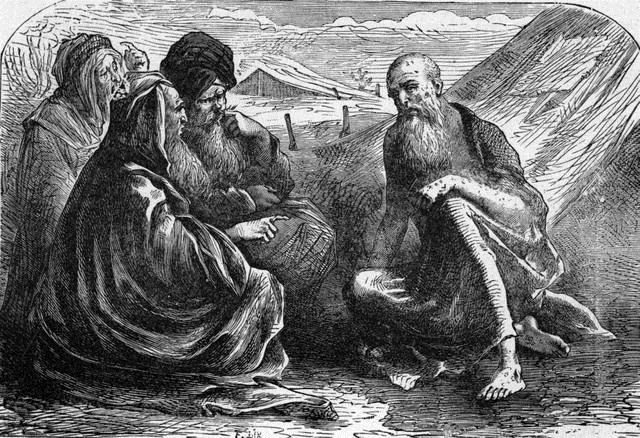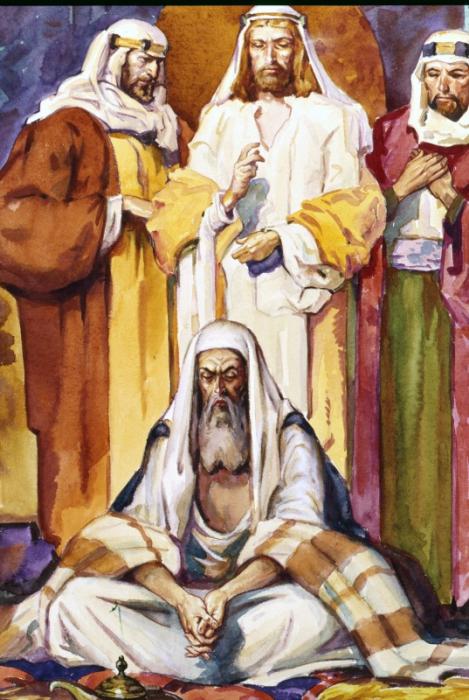Old Testament among its so-callededucational books has an interesting work, called the Book of Job. The name was given to her by the name of the main character, the pious righteous and faithful servant of God.
Book structure
To understand what constitutes a majorhero, you need to first understand the work. The story of the misadventures that the biblical character Job is undergoing is divided into a prologue, a main part and an epilogue.
The prologue describes the blessed lifethe righteous, his prosperity in the spiritual and material terms. The main part is about how Job, who is long-suffering, undergoes the grief that fell to his lot as a result of the dispute between Satan and God. By itself, this part is divided into three sections: the conversation of Job with friends, the words of Elius and the speech of the Most High. The epilogue closes the circle and tells about the restoration of justice and the return of the welfare of the prophet.

Narrative canvas works
The story begins with the fact that the meetingSatan came to the sons of God and began to provoke God to take away his blessing from the righteous and sinless Job, to check whether he would remain faithful to the Almighty in grief. As a result, God gives in to provocation and puts his servant in the hands of the devil with one condition - not to kill him. Later, the biblical character Job experiences a series of upheavals: all his sons and daughters die at the same time, he loses all his wealth and property, and he severely becomes ill with leprosy. To comfort and support him, three friends come to him. Most of the book is just their speeches and the answers to them by Job, in which they jointly try to establish the reasons why such disasters have befallen the righteous. They believe that the long-suffering Job is guilty of some grave sin, because, in their opinion, God would have saved the innocent from unnecessary agony. But the prophet stubbornly declares his integrity and, humbled under the authority of God, blessing his name, nevertheless calls him to account. In the end, God appears and denounces the iniquity of both Job himself and his friends. The Lord arranges judgment and asks questions to the protagonist, to which he is unable to answer. Nevertheless, in conclusion, God praises the faithfulness and patience of his servant, heals him of the disease and multiplies the lost property more than the former. He blames his friends for slandering himself and orders them to ask Job to pray for them in order to avert the punishment for saying “not so true” about him. The story ends here.

The historicity of the book
Religious leaders of Judaism and Christianity beforethe twentieth century for the most part believed that the history of the biblical Job historically accurate. Those who claimed the legendary events described in the book, as well as denying the very existence of this prophet, were usually compared with heretics. It happened, for example, with Theodore of Mopsuestia, who was condemned by the fifth Ecumenical Council. But the development of biblical studies in the twentieth and twenty-first centuries led to the fact that the scales began to lean on the other side. Today, many serious Bible scholars believe that the story of the biblical Job is a parable, a pedagogical poem, and not a story about the life of a real person.

The lifetime of Job and the time of writing the book
Immediately it should be said that all attempts to installthe time when the biblical character Job lived was doomed to failure. First, he was the head of a tribe of nomads, like the people in the Middle East, and was not tied to the book by any city or monarchist dynasty. Secondly, most likely, the long-suffering Job is a collective image. He is probably not even of purely Jewish descent, because in the Bible he is referred to as a man without a pedigree, having neither a father nor a mother. Meanwhile, the Jews always mentioned the genealogy when they talked about people (whether they were living people or biblical characters), bringing their origin to Abraham, the forefather of the Jews. Therefore, it is most logical to assume that the book is based on a Middle Eastern pagan legend, creatively crafted by a Judean author.
But about the writing of this poem inAs she entered the canon of the Bible, certain assumptions can be made. Based on the internal analysis of the text, language, structure, the presence of Aramaic influence and late signs of faith, one can more or less confidently assume that the middle of the first millennium BC is the time when literary hero Job was born. The Jewish Bible at that time was codified and seriously edited. Probably, at the same time, in the pedagogical purposes, the narration about the suffering righteous person was added to it.

Authorship of the book
The question of who owes his originbiblical character of Job, not easy to decide. On the one hand, the book is included in the Jewish canon of the Scriptures, and on the other hand, all its protagonists among the people are not Jews. Job's wife is an Arabian, friends are also representatives of various non-Jewish Semitic nations. Plus, the language of the book is very much Arabized, which allows us to make two assumptions: either the author was an Arab, or a Jew who lived in an Arabic environment.
In the church tradition, the author considered different people - Moses, Solomon, Jeremiah, and other significant figures of the Old Testament. But in support of these hypotheses there are no arguments.

Interesting details of the book of Job
Bible readers periodically appearquestions about some strange creatures that inhabit the earth. An example of this is the famous Leviathan. This is the story of the biblical Job, one of the few mentions it, putting in the mouth of God the mention of the grand sea monster. Along with him mentioned some behemoth. Most likely, we are talking about a mythical huge creature that is not subject to human power. The Lord says to Job that only he who created him can stick his sword into it. Another interesting place is at the very beginning of the text, where Satan is spoken of as the son of God, one of his angels.

Conclusion
Данная книга стоит особняком в каноне по своему content and form. And although very few people doubted its canonical dignity, it is ambiguous on the most important issue - the question of evil. Such strange images as a hippopotamus or leviathan are not related to this. This is the story of the biblical Job teaches believers that the answer to the question about the cause of suffering a person does not know. After all, God is to call Job, but does not want to be responsible and does not give an answer, but simply crushes him with his authority and power, asking questions to which a person is powerless, with the result that the hero simply “puts his hand on his lips.” The very plot of the dispute does not receive development and outcome. Thus, it is not clear what and to whom God argued, guiding his most faithful servant through terrible sufferings (including the death of ten innocent children of Job). Moreover, the actions of the Lord themselves can hardly be called ethical in the modern sense of the word.












